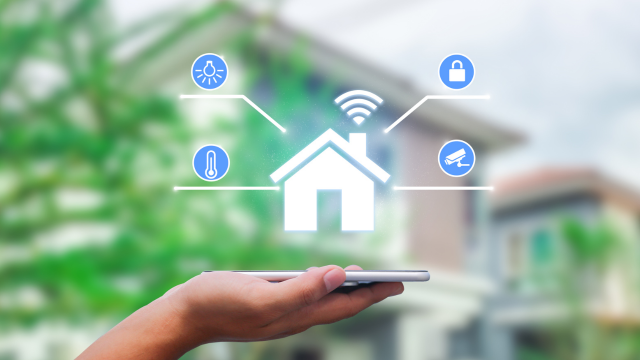Smart monitors are an important part of transforming a regular home into a high-tech smart home. They provide essential information for intelligent control and automation, acting as the eyes and ears of your home automation system. Homeowners can improve comfort, safety, and energy consumption by adding different types of sensors. Here are some of the top smart displays to make your home automation work better.
1. Understand Smart Sensors
Smart sensors are gadgets that monitor certain things in your home and send the information to a main controller or hub. They are important for managing home functions because they can sense changes in their environment and take appropriate actions. These sensors can monitor temperature, humidity, motion, smoke, and more. The data they collect is useful for automating and controlling various home systems.
2. Temperature Sensor
Temperature sensors are an important part of keeping heating and cooling systems running smoothly. They monitor the temperature in different places and send that information to your smart thermostat. Adding a temperature sensor to your thermostat can help you maintain a comfortable temperature while optimizing your energy usage. Based on the temperature monitor’s readings, the thermostat can adjust the heating or cooling system to make the room more or less comfortable.
3. Motion Sensor
Motion sensors are a must for home automation and security. When they detect movement in an area, they can be set to perform various actions, such as turning on lights or sounding an alert. For example, motion sensors installed in a lobby or hallway can automatically turn on lights when someone enters, keeping everyone visible and safe. Motion monitors in security systems can let people know when someone is moving without being noticed, which can be very useful for spotting intruders or keeping an eye on what’s going on.
4. Door and Window Sensors
Door and window sensors are a must for protecting your home. These sensors can detect when doors and windows are open or closed and can send you a message if someone tries to gain access without permission. They are often used in security systems to let you know immediately if a door or window has been broken into, helping to keep your home safe. Door and window monitors can also be added to smart home systems to save energy by automating tasks such as turning off the air conditioning when windows are opened.
5. Carbon Monoxide and Smoke Detectors
To keep your home safe, you need smart smoke and carbon monoxide monitors. When these sensors detect smoke or carbon monoxide, they sound an alarm to alert people of the potential risk. Compared to regular alarms, smart alarms can send alerts to your phone even when you’re not home, so you’ll know right away if something is wrong. When connected to a home automation system, they can trigger automatic responses such as turning on lights and unlocking doors, making it easier to quickly escape in the event of an emergency.
6. Humidity Sensor
Humidity sensors monitor humidity levels, which can impact your health and comfort. They are especially useful for controlling indoor air quality and preventing problems such as mold growth. By adding a humidity sensor to your HVAC system, you can keep the humidity in your home at the right level. For example, if the humidity exceeds a certain point, the monitor can turn on a dehumidifier or change the temperature of an air conditioner to bring the environment back into balance.
7. Light Sensor
Light sensors can detect how bright the light is in a location. They are often used in automated lighting systems to change the brightness of the lighting system based on the amount of natural light. For example, light sensors can dim indoor lights during the day when there is a lot of natural light. This saves energy and makes the room feel more comfortable. They can also be used to turn off lighting systems when natural light is present or absent so that the lights only come on when needed.
8. Water Leak Sensor
Leak monitors are used to detect leaks and excess moisture in areas where water damage can occur, such as basements, under sinks, and near appliances. These tools allow people to identify leaks before they cause significant damage so they can be repaired quickly. When connected to a home automation system, water leak monitors can automatically take actions such as turning off water or sending alerts to your phone to help prevent flooding and water damage.
Conclusion
Smart sensors are an important part of creating a connected and well-functioning smart home. They provide us with useful information, help us automate tasks, make things safer, and make us feel better. You can make your home automation system work best for you by adding various sensors such as temperature, motion, door, window, smoke, humidity, light, water leak, shade, and outdoor sensors. These sensors make living spaces safer and more convenient, and they also help manage energy consumption and maintain the overall health of the home. Equipping your home with the right smart devices ensures that it functions properly and intelligently, giving you a better, more seamless living experience.
FAQs
1. What is a smart sensor? How do they work?
Smart sensors are gadgets used in home control systems to monitor various aspects of the environment and send information that causes certain actions to take place. When they detect changes in their environment, such as changes in temperature, movement, or light levels, they send information to a central hub or controller. The center then analyzes the information and initiates automated actions or alerts based on user selections or preferences.
2. What are the benefits of using motion monitors for home security?
Motion sensors make homes safer by identifying movement in specific areas. They can sound an alarm, turn on lights, or let you know when something strange is going on. For example, motion sensors can let you know if someone enters a restricted area, or automatically turn on your outdoor lights when someone approaches your home. This makes it safer and deters potential thieves.
3. How can door and window sensors make my home safer?
Sensors on doors and windows tell you when they’re open or closed. They’re an important part of your security system because they can immediately notify you if someone enters without permission. They can also save energy by automating other tasks in your home, such as turning off the air conditioning when windows are open.
4. What role do smoke and carbon monoxide detectors play in home automation?
Carbon monoxide and smoke detectors are very important for safety. Some versions of these detectors are so smart that you can tell on your phone if they’ve detected smoke or carbon monoxide, even if you’re not there. Integration with home control systems can make things happen automatically, such as turning on lights and unlocking doors, making it easier for people to leave their homes safely.
5. What are the benefits of light sensors in home control?
Sensors that capture light can be used to control the amount of natural light entering a room. This allows you to adjust the lighting inside depending on the amount of natural light. This saves energy and makes the space more comfortable. For example, light sensors can save electricity by switching off the lights in your home during the day when the sun is shining brightly.




